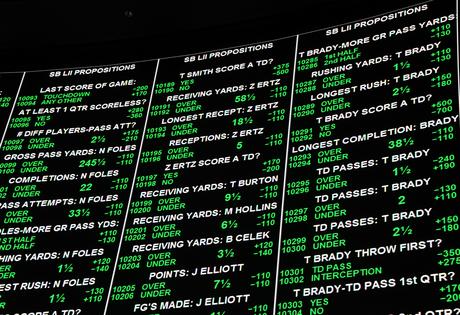Terry Savage: Wanna Bet?
Fall is already in the air in many parts of the country. Kids are back in school and the football season has started. What’s the tie-in for a personal finance column? Well, for many millions of people the football season is also the start of the official “gambling season.”
It’s expected that legal football bettors will wager about $30 billion this year, up around 8% from last year, according to ESPN. And that’s the legal betting. That sum could be dwarfed by offshore betting parlors, which are estimated to rake in more than $100 billion in bets.
Football betting dominates all sports betting. That’s despite the fact that the pro football season is relatively short compared to basketball and baseball — only 17 games in the regular season, leading up to the playoffs and the ultimate betting event of the Super Bowl. But that’s the tip of the football betting market. Don’t forget the widespread betting on college football.
The financial tsunami of sports betting comes as 38 states have legalized some form of sports betting, either online or in person. Major states such as Texas and California still don’t have legalized gambling, so they likely generate a substantial part of the offshore betting phenomenon. Federal wire laws do not allow interstate gambling, although the boundaries of those laws are now being pushed by an interstate gambling compact.
The states that do allow gambling definitely benefit from some form of taxation on the activity. Except for “professional gamblers,” federal income taxes apply to winnings, which are considered ordinary income, with a mandatory 24% withholding from bets paying off more than $5,000.
States set their own tax rates. Estimates of state gaming revenues for 2025 approach $16 billion — if you count revenues from all gaming activities including race tracks and casinos. According to one source (RG.org), the state of New York took in more than $300 million in gaming revenues in just the first quarter of 2025.
When you think that just over 100 years ago, sports betting (and alcohol!) were illegal in America, you can see how this industry has grown. In 1931, Nevada re-legalized sports betting — and it was the only state in which gambling was legal for decades.
Today you can place all sorts of bets instantly online. The corner bookie has been replaced by online platforms such as FanDuel, DraftKings, BetWhale, Caesars and BetMGM, to name a few. There’s now even a form of football betting on Robinhood, through predictions market Kalshi, which offers “events contracts.”
The major sites offer bets on all sorts of things inside the game — “prop bets” — not just on which team wins the game. You can bet on how many points will be scored in a quarter, how many pass attempts, rushing yards or receiving yards for individual players. There’s no end to the opportunities to speculate. Professional bettors know this is not a simple guessing game; they base their decisions — and their bets — on a study of the statistics.
Of course, the house always has an “edge” — typically 4.76%, (which equates to standard -110 odds), so the companies can make money on both sides of the bet! Many of these companies are publicly traded, and their stocks are highly volatile. Their income depends on the volume of sports betting, which is likely to set records this year.
Technology is an integral part of online betting. No more wads of bills being exchanged as bets settle. Today you can use PayPal to handle your transactions. And you can even bet using cryptocurrencies.
Getting started is easy — perhaps too easy! You can open an online account instantly, connecting your payment system. In fact, you can’t miss the television commercials offering promotions for signing up. It’s a very competitive part of the fall betting season.
By now, many of my regular readers are expecting a morality lesson, not a betting lesson! Just like all other financial activity, there are significant emotional temptations in most financial decisions.
Not everyone is cut out to be a stock trader. And not everyone is equipped to handle the emotional stress from betting on sports. Not that the two activities are completely comparable, since history says you come out a winner over the long run when you invest — not speculate — in stocks.
Betting is pure speculation. And it’s easy to get carried away. That’s why every TV commercial — and this column — will include the toll-free number for the National Problem Gambling Helpline: 1-800-GAMBLER. Gambling to “get even,” or to pay the bills, or to pay off credit card debt is a sure sign of a problem.
But sports betting is a huge business, and it is here to stay. If you — or someone you love — is doing this beyond just adding a bit of interest to the fall football season, you should recognize the signs. And help them get help. The rush of football betting can turn into an addiction. And that’s The Savage Truth.
========
(Terry Savage is a registered investment adviser and the author of four best-selling books, including “The Savage Truth on Money.” Terry responds to questions on her blog at TerrySavage.com.)
©2025 Terry Savage. Distributed by Tribune Content Agency, LLC.















Comments